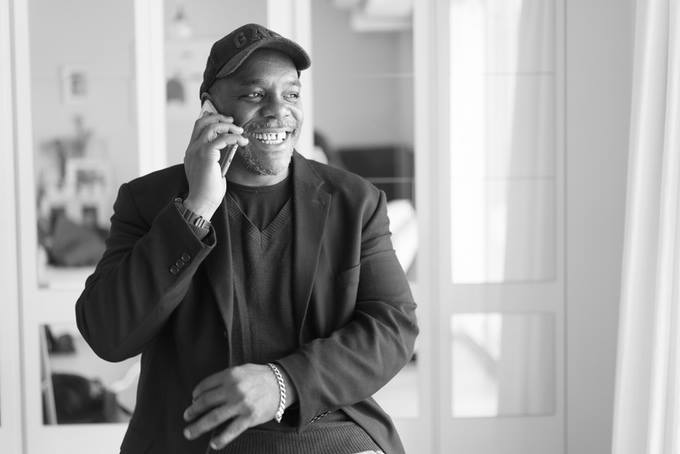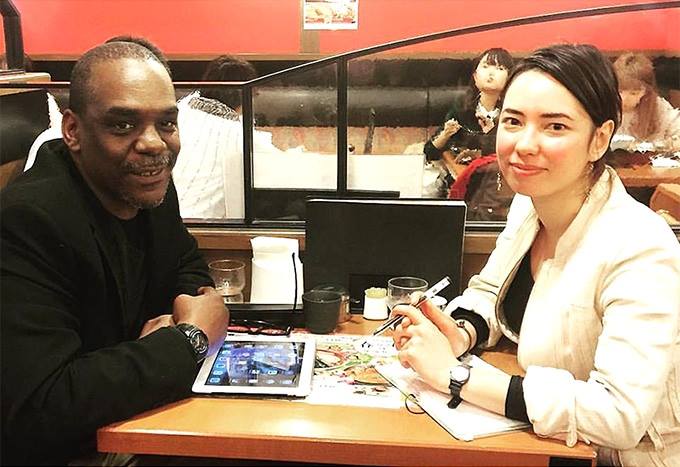Baye McNeil is one of Japan’s most prominent English language writers. His “Black Eye” column in the The Japan Times is must-read material. In it, McNeil explores the unique experience of being black in Japan with honesty and humor. McNeil has also participated in anti-racist activism: he created a successful petition protesting a blackface performance by neo-minstrel group Rats & Star, and idol group Momoiro Clover Z.
With the lessons he learned from his petition, and a desire to share the insights from his writing with Japanese speakers, Baye has launched a Kickstarter campaign to have his book “My Name is Loco and I’m a Racist” translated into Japanese. English-speaking supporters of the campaign can receive a copy of his next book, “Winning Abroad,” featuring interviews with several foreigners who have found success in Japan.
Tokyo Weekender talked to Baye about the campaign, what he hopes Japanese people can learn from his work, and interviewing Bob “The Beast” Sapp.
Why did you come to Japan, and why did you stay?
I came here initially to escape the post 9/11 toxicity of the atmosphere in New York physically (the residue of the Towers hovered over us for months) and in the country as a whole, psychologically. I stayed in Japan at first because I was having a ball. It was like living at your favorite theme park, one that catered to your every need. But, once I found love, that’s when I knew I was here for the long haul. Sadly, she passed but I still feel her energy around me from time to time.
What has been the most positive and negative things about being black in Japan?
It’s difficult to simplify such a thing in terms of positive and negative, good and bad. I think some of the incidents I might have interpreted as positive initially turned out to have negative repercussions and vice versa. Positive and negative have a way of working together, simultaneously. At least that has been my experience.
For example, when I first got here, I realized that girls of a higher caliber and vaster variety than I had ever before dated were into me primarily for the exoticism my blackness represented for them. And this registered to me as a positive. Until I realized several years later how this nonsense was diminishing my respect for myself and the people here, almost to a point where I couldn’t even retrieve it. Fortunately, I did.
As for negatives actually being positives, when I first encountered this “empty seat” business – this practice where Japanese will leave the seat beside you, and only you, empty on trains – I registered this as a negative. But, lo and behold, that phenomenon spurred me into some very deep introspection, resulting in some significant personal growth, and the writing that led to my becoming a professional writer. Thanks in part to that empty seat! Go figure.
Were you surprised by the support you received for the anti-blackface petition?
I had an inkling there might be some but the overwhelming support it got frankly surprised the hell out of me. I mean, as a foreigner in Japan, you’re likely to run into some of the more progressive people here because they’re typically the ones emboldened enough to interact with you and share ideas. But, from the behaviors and attitudes of the general populace, you do get the impression that people are unwilling to get into anything that does not have collective appeal. And this campaign I felt decidedly didn’t. And I was right. I mean 5,000 people is hardly a blip. But it was enough to get the network to reconsider. And it was enough to draw tears of joy, and a renewed resolve to think much more collectively when I consider projects moving forward, knowing that there’s a “blip” of Japanese out there who are open to ideas that don’t originate from Japanese minds.
What do you hope Japanese people learn from your book?
If a Japanese person reads my book and says, “Holy cow! I had no idea we had so much in common with black people … they’re just as awesome and awful as we are!” or something like that, I’d be gratified. A genuine, “I had no effing idea!” moment, replete with laughs and tears and head scratches followed by a gradual shift in the collective consciousness to something approaching genuine empathy. A real starting point. A recognition of a commonality that reaches beyond race and nationality, to the essential, at a level heretofore rarely seen. I hope the ideas presented in the book set off a national conversation, between those of us who love this country and have come to call it home, and our Japanese friends, families and colleagues.
What has been the response to the Kickstarter so far?
Fifteen days in and we’re about 90 percent funded, so it’s looking good. Having learned from my experience with the petition, I endeavored to make this campaign as accessible in Japanese as it is in English. And the results have been promising. I’ve seen an increasing number of Japanese participants, though it’s hard to say how many of them knew English from the get-go and so all the translating and subtitling my team did may not have been necessary. I suspect some were able to navigate freely though. Most of the non-Japanese support has come from people who have supported my work all along or have been introduced to it via this campaign … and that number has been surprisingly high!
What’s the most interesting story of “Winning Abroad” you’ve learned?
I’m not going to elaborate, but when I interviewed the great Bob “The Beast” Sapp, he told me an anecdote about how he came to know the true heft of that trunk of racial luggage he lugged to Japan from the States when he first came here, and the experience of how he finally began to unpack it. It’s a fascinating tale I cannot begin to do justice here. But it’ll be in the book for sure!
You can learn more about Baye’s work at locoinyokohama.com
Updated On July 13, 2017









